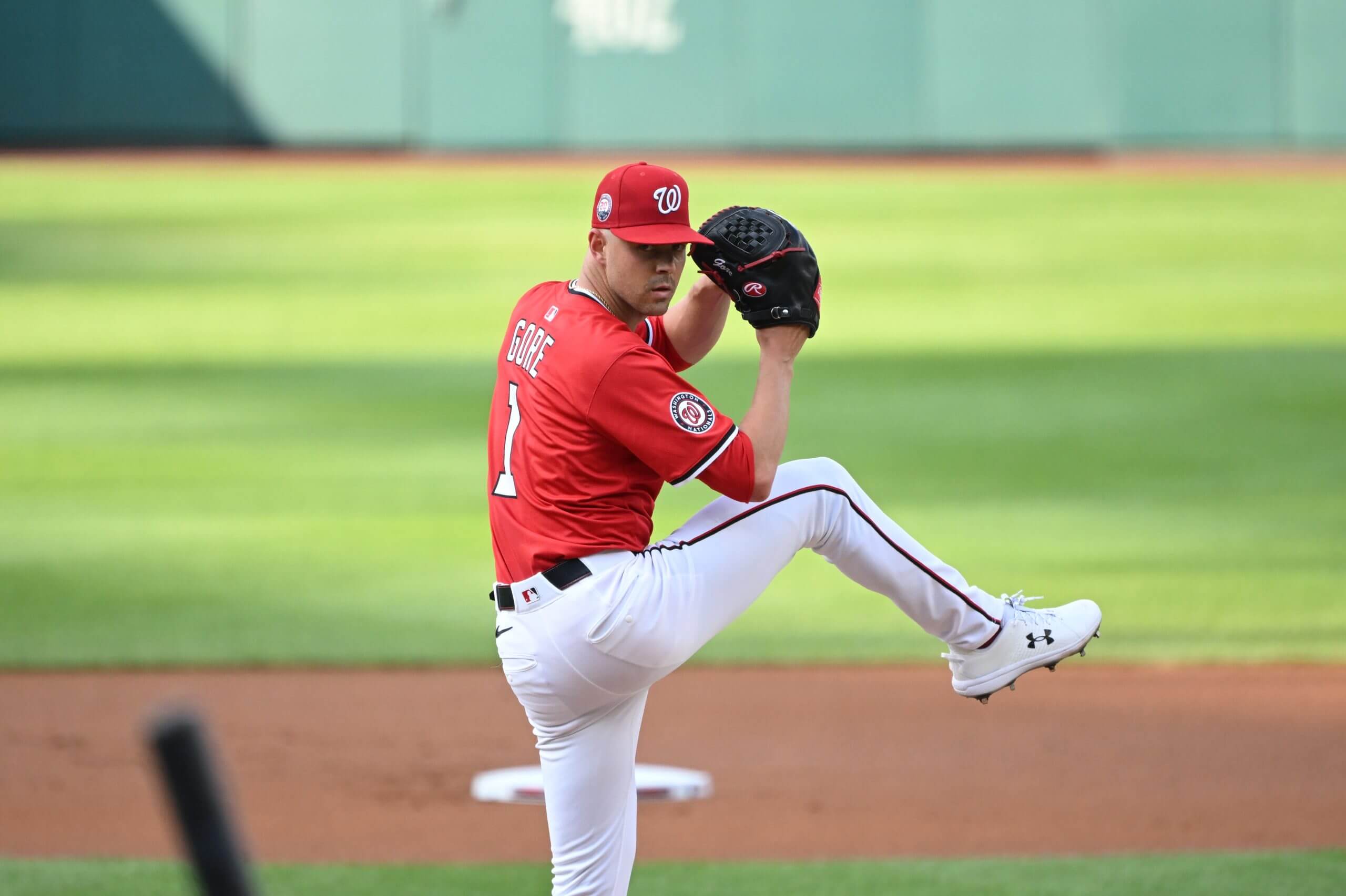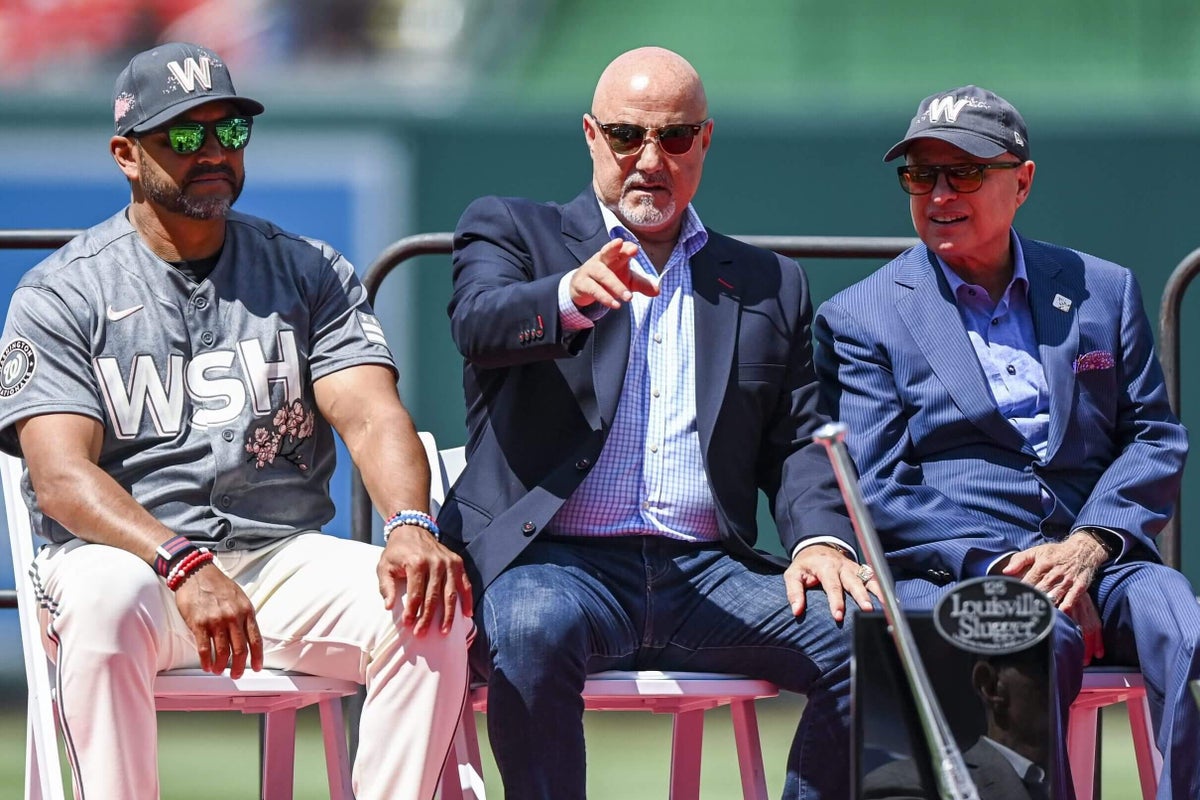Indifferent. Apathetic. Disconnected.
All of those words seemed to apply in recent seasons to the Washington Nationals ownership group, headed by Mark Lerner.
Well, wonder of wonders, ownership just snapped out of it, at just about the oddest time imaginable — one week before the Nats will make the No. 1 pick in baseball’s amateur draft and less than a month before the trade deadline.
The timing of the Nationals’ dismissals of president of baseball operations Mike Rizzo and manager Davey Martinez on Sunday was so sudden, ownership did not even appear fully prepared.
Lerner named a successor for Rizzo, assistant GM Mike DeBartolo, but held off announcing Martinez’s replacement until Monday. Bench coach Miguel Cairo and Triple-A manager Matthew LeCroy would appear the most logical candidates.
If Lerner and company were desperate to draw attention away from themselves, a theory advanced by one former team executive, they sure had an odd way of going about it.
Not that Rizzo, the game’s second-longest tenured head of baseball operations, and Martinez, the manager who led the franchise to its only World Series title in 2019, necessarily deserved to keep their jobs. The Nationals’ 37-53 record is the fourth worst in the majors. More telling, the Nats since 2019 rank second in the majors in losses, ahead of only the Colorado Rockies.
True, ownership needed to decide this month on 2026 options for both Rizzo and Martinez. But general managers almost never get fired before the deadline. The last time it happened, as far as I can tell, was when the Minnesota Twins dumped Terry Ryan on July 18, 2016.
Ryan, at least, got to oversee the Twins’ draft that year. In 2021, the draft moved from June to July. So in dumping Rizzo, the Nationals are leaving both the draft and deadline to DeBartolo, the new interim GM.
The No. 1 pick, as the Nationals know well from their selections of Stephen Strasburg in 2009 and Bryce Harper in 2010, is a monumental opportunity for any franchise. By now, the draft boards of most teams are in relative order. But picking first isn’t always about simply choosing the best fit for an organization. Teams sometimes operate strategically, signing a player for less to spread bonus pool money to other talents in later rounds. That strategy might make particular sense this year, with no clear No. 1 pick emerging.
The deadline, for the Nats, is perhaps less meaningful — they do not figure to be terribly active. Among their players on expiring contracts, reliever Kyle Finnegan is perhaps their most attractive chip. Right-hander Mike Soroka has a 5.40 ERA. Infielders Amed Rosario and Paul DeJong, if moved, wouldn’t figure to bring back much.
Rizzo, of course, made one of the best deadline trades in recent memory in 2022, acquiring two players who were named National League All-Stars on Sunday, left-hander MacKenzie Gore and left fielder James Wood, as well as a third who was a strong candidate to make the team, shortstop CJ Abrams.
That deal, as I wrote on May 27, could mask only so much. The Nationals’ failures in player development, as well as in amateur and international scouting, go back more than a decade. Rizzo made changes to scouting and player development at the end of 2023. But they might have been too little, too late.
Lerner, in announcing the moves Sunday, resorted to standard ownership speak, citing a need for a “fresh approach and new energy.” Which, in a vacuum, is not an unfair analysis. But ownership previously extended Rizzo on several occasions, in part because it could not seem to imagine anyone else leading the organization.

All-Star pitcher MacKenzie Gore’s future in Washington will now be the responsibility of interim general manager Mike DeBartolo. (Rafael Suanes / Imagn Images)
If anything, the dismissal of Martinez was more surprising. As The Athletic’s Britt Ghiroli wrote last month, Martinez was well-liked by ownership. He signed his last contract before Rizzo agreed to his.
Perhaps ownership decided it had enough of Rizzo’s strong personality. And perhaps Martinez’s comments after a loss to the Miami Marlins on June 14 marked a turning point in how ownership viewed him.
“We’re not going to finger-point here and say it’s on the coaches. It’s never on the coaches,” he told reporters. “Sometimes you’ve got to put the onus on the players, they’ve got to go out there and they’ve got to play the game.”
Martinez later backtracked, saying of his players, “It wasn’t on them. My comments (were) nothing about them. They know that.” But it’s never a good look when a manager blames his players.
Lerner’s statement, naturally, made no mention of ownership’s own culpability. The Nationals had a top-10 payroll seven of eight seasons between 2014 and 2021. In the past three years, however, they’ve averaged in the bottom 10. And Rizzo seemed to take a shot at Lerner and company on the way out, telling Barry Svrluga of the Washington Post that he “navigated that ownership group for almost 20 years.”
The fallout from all this is coming soon, first with the draft, then at the deadline. If ownership allows, perhaps DeBartolo will take an aggressive approach with trades, entertaining offers on players who are under club control beyond this season. The boldest thing he could do would be to listen on Gore, who is at the same level of service Soto was when the Nats traded him in 2022.
An extension for Gore is unlikely. Like Soto, he is represented by Scott Boras, who generally prefers his clients to establish their values on the open market. For a pitcher of Gore’s quality, one who is available for three pennant races, the Nationals perhaps could acquire three or four building blocks.
Of course, such a move would require the type of vision Nationals ownership rarely shows. Firing a losing president of baseball operations is defensible as long as ownership has a plan. When ownership makes such a move just before two of the biggest transactional days on the baseball calendar, it’s fair to question what that plan might be.
(Top photo of Martinez, Rizzo and Lerner in 2022: Jonathan Newton / The Washington Post via Getty Images)
